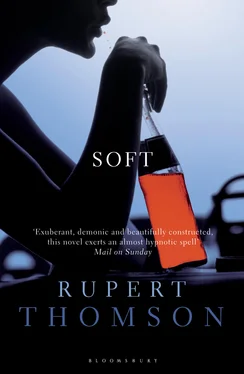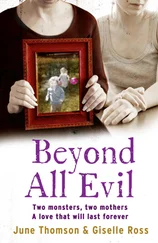‘You can’t ring him back, I suppose.’
‘No.’
Charlie didn’t speak again until they reached her front door.
‘You know,’ he said slowly, ‘I saw something in the paper that might interest you …’
Upstairs he showed her an advertisement, no more than two inches square. EARN £100, it said. Underneath, in smaller letters, it gave a phone number. One hundred pounds, she thought. It was the right amount. She would be able to buy a dress, maybe even a pair of shoes as well.
She looked at Charlie. ‘What would I have to do?’
He shrugged. ‘Could be anything.’ He reached for the phone and dialled the number, but nobody answered.
On Monday Glade took Charlie’s paper into the restaurant with her. She waited until she had finished setting up, then she called the number again, using the pay-phone near the toilets. The first three times she dialled, the number was engaged, but she kept trying. At last a man’s voice answered.
‘I’m calling about the advert,’ she began.
‘Yes?’
‘This money,’ and she paused, ‘what am I supposed to do for it?’
Like so much of what she said, it came out wrong and yet the man didn’t laugh at her. Instead, he explained that he was a member of a medical foundation which was attached to the university. At present they were researching sleep staging — polysomnography, to be precise. They were advertising for subjects who might be willing to participate in their research.
‘I see,’ Glade said uncertainly. ‘And what does it involve?’
The man told her she would be required to spend two nights at a clinic in North London. While she was sleeping, she’d be monitored.
‘Is that all?’
‘Think of it like this,’ and the man sounded as if he was smiling, ‘we’ll be paying you to sleep.’
Glade stared at the advertisement until it began to vibrate, slide sideways off the page.
‘We’re starting a new programme on Wednesday,’ the man went on. ‘You could come in then. Or Friday, if that’s more convenient. What do you do?’
‘I’m a waitress,’ Glade said.
‘May I take your name?’
‘Glade Spencer.’
Still holding the receiver to her ear, she turned and stared back down the corridor. The restaurant’s double-doors stood open to the street. The sunlight that shone into the building reflected off the polished floor and almost blinded her. She watched two people walking in. They looked insubstantial, weightless, like pieces of burnt paper. They didn’t appear to have feet.
We’ll be paying you to sleep .
She could think of nothing better.
When Glade returned from work that afternoon, she found a letter on the door-mat in the hall. It was from her mother. She bent down and picked it up, handling the envelope much as her father would have done, she realised, turning it over in her fingers, trying to discover what its purpose was, what it meant. ‘Glade Spencer,’ she murmured. ‘Inglaterra.’ With its loops and dashes, her mother’s handwriting seemed to convey both generosity and carelessness.
Sitting at the kitchen table, Glade opened the envelope. One neatly folded sheet of mauve paper. She unfolded it and began to read. Glade, darling, I know I should have written before now, but I’ve been so busy with the new apartment. Gerry says — Glade lifted her head and stared out of the window. Whenever she received a letter from her mother, she always felt as if she had opened someone else’s mail. Though she could see her own name on the envelope, its contents never seemed to be addressed to her. But she read on. Her mother talked about whitewash and seafood. About Gerry’s friends, who all had swimming-pools. About the heat. She seemed to expect Glade to understand, to enthuse with her — to agree . She might as well have been speaking a foreign language. I don’t blame them, do you? The sunshine, the maracas …
That evening Glade built another fire, even though the weather was warmer and the trees outside her bedroom window were beginning to release their blossom; the winter had lasted so long that she had forgotten spring might be a possibility. At half-past six Charlie rang, to thank her for the weekend. She described what had happened when she called the number in the paper, then she asked him what he knew about sleep research. He began to tell her about sleep laboratories, somnolence, electrodes –
She interrupted him. ‘Electrodes?’
He laughed. ‘You won’t even know they’re there. They’re like bits of sticking-plaster with wires attached to them. Or sometimes they use physiological glue. They monitor your brainwaves. Your eye-muscle movement as well.’
She shuddered slightly. ‘It won’t do me any harm, then?’
‘I can’t see how. And it’s a hundred quid, remember.’
‘That’s what the man I spoke to said.’ She poked a piece of wood deeper into the fire. ‘So you think I can do it?’
‘Why not?’ Charlie said. ‘It’s a dress.’
She felt much better for having talked to Charlie. He seemed to bring clarity to situations that she found confusing. You needed people like that — people who would tell you that everything was all right, that you weren’t mad.
Or if you were, then they’d look after you.
The front door slammed; her bedroom windows rattled in their frames. She turned round, looked out into the corridor. She saw the back of Sally’s head rise into view. At the top of the stairs Sally stopped and kicked off both her shoes. One of them flew in strange slow-motion through the air, glancing off the wall, which it marked with a precise black tick, as if to prove that it had been there. Sally vanished into the bathroom. The sudden, vicious crash of water on enamel.
Glade moved cautiously out of her room and down the corridor. ‘Sally?’ As she reached the doorway to the bathroom, Sally brushed past her, trailing steam. Glade followed her into the kitchen. ‘Sally, would you do me a favour?’
‘Don’t tell me. Feed the cat.’
‘It’s only for two days.’
Sally looked at her for the first time since arriving home. ‘Miami, I suppose.’
‘No,’ Glade said. ‘I’m going into a clinic.’
‘Nothing wrong, is there?’ Sally’s eyes widened and glittered. She lit a cigarette. ‘Are you all right?’
‘I’m fine,’ Glade said. Which almost made her feel guilty. She felt she should have invented an illness, a disease. Something an American might give you. ‘I’m taking part in a sleep-research programme.’
‘Whatever for?’
‘They’re paying me. I need a dress —’ Glade bit her lip. She had given it away.
‘You are going to Miami.’
‘I’m not. It’s just that Tom’s invited me to a wedding.’ Glade hesitated, then she said, ‘In New Orleans.’
‘New Orleans? I don’t believe it.’ Sally turned away and stood at the window, her cigarette held just below her mouth. ‘New Orleans,’ she said, more mistily this time. ‘The French Quarter, Bourbon Street …’
Glade looked puzzled. ‘Bourbon Street?’
‘You don’t know how lucky you are.’ Sally’s voice was faint, as if she was very far away — or even dead, perhaps, and appearing to her flat-mate in a dream. ‘You don’t know anything.’
Shortly after take-off, Glade felt thirsty. She waited until a stewardess was passing, then she reached out and touched the woman on the arm.
‘Do you have any Kwench!?’
‘Kwench!?’ The stewardess bent down, smiling.
‘It’s a new soft drink,’ Glade explained.
‘I haven’t heard of it.’
No, Glade thought. Nor have I. How odd.
‘Would Coke do?’ the stewardess asked her.
Читать дальше












